 W
WThe First Sea Lord and Chief of the Naval Staff (1SL/CNS) is the professional head of the United Kingdom's Royal Navy and the whole Naval Service. The current First Sea Lord is Admiral Tony Radakin.
 W
WAdmiral Sir Charles Adam, FRSE KCB was a British naval officer who served during the Napoleonic Wars. He later commanded the royal yacht, Royal Sovereign, and was the Member of Parliament for Clackmannanshire and Kinross-shire. He held the office of First Naval Lord three times. In that capacity he dealt ably with the economies of a peacetime budget, provided naval support for the expulsion of Muhammad Ali's forces from Syria in 1840 and ensured technological progress continued. He was also the father of William Patrick Adam, a colonial administrator and Liberal politician.
 W
WAdmiral of the Fleet Sir Edward Beckwith Ashmore, was a senior Royal Navy officer. He saw active service in the Second World War and later commanded two frigates before achieving high command in the Navy. He served as First Sea Lord and Chief of the Naval Staff in the mid-1970s and in that role he advised the incoming Labour government on a major defence review and on the implications of the Turkish invasion of Cyprus. He went on to be Chief of the Defence Staff, serving briefly in a caretaker capacity following the death of his predecessor.
 W
WAdmiral of the Fleet Sir Roger Roland Charles Backhouse was a Royal Navy officer. He served in the First World War as a cruiser commander and after the war became a battle squadron commander and later Commander-in-Chief, Home Fleet. Becoming First Sea Lord in November 1938, his major contribution in that role was to abandon the official British policy of sending a major fleet to Singapore to deter Japanese aggression, realising the immediate threat was closer to home and that such a policy was no longer viable. He died from a brain tumour in July 1939 just before the outbreak of the Second World War.
 W
WAdmiral Sir Jonathon Band is a retired Royal Navy officer who was the First Sea Lord and Chief of the Naval Staff from 2006 to 2009. Before serving as First Sea Lord he was Commander-in-Chief Fleet. Since becoming First Sea Lord, Band had been a firm advocate of the creation of new ships to meet new threats and maintain the status of the Royal Navy as one of the world's leading naval forces.
 W
WDavid Richard Beatty, 1st Earl Beatty, was a Royal Navy officer. After serving in the Mahdist War and then the response to the Boxer Rebellion, he commanded the 1st Battlecruiser Squadron at the Battle of Jutland in 1916, a tactically indecisive engagement after which his aggressive approach was contrasted with the caution of his commander Admiral Sir John Jellicoe. He is remembered for his comment at Jutland that "There seems to be something wrong with our bloody ships today", after two of his ships exploded. Later in the war he succeeded Jellicoe as Commander in Chief of the Grand Fleet, in which capacity he received the surrender of the German High Seas Fleet at the end of the war. He then followed Jellicoe's path a second time, serving as First Sea Lord—a position that Beatty held longer than any other First Sea Lord. While First Sea Lord, he was involved in negotiating the Washington Naval Treaty of 1922 in which it was agreed that the United States, Britain and Japan should set their navies in a ratio of 5:5:3, with France and Italy maintaining smaller ratio fleets of 1.75 each.
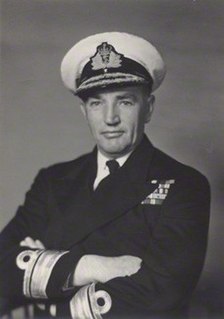 W
WAdmiral of the Fleet Sir Varyl Cargill Begg was a Royal Navy officer. He fought in the Second World War as gunnery officer in a cruiser taking part in the North Atlantic convoys, the Norwegian campaign and the occupation of Iceland and then as gunnery officer in a battleship operating in the Mediterranean Fleet during the Battle of Cape Matapan. After that he commanded a destroyer during the Korean War and was Commander-in-Chief of Far East Command during the Indonesia–Malaysia confrontation. He was First Sea Lord and Chief of the Naval Staff in the late 1960s. In that role he vehemently opposed plans to introduce large new aircraft carriers and instead managed to persuade the British Government to develop the design for three small "through-deck cruisers".
 W
WAdmiral of the Fleet Michael Cecil Boyce, Baron Boyce, is a retired Royal Navy officer who now sits as a crossbench member of the House of Lords.
Admiral Sir Francis Charles Bridgeman Bridgeman was a Royal Navy officer. As a captain he commanded a battleship and then an armoured cruiser and then, after serving as second-in-command of three different fleets, he twice undertook tours as Commander-in-Chief of the Home Fleet with a stint as Second Sea Lord in between those tours. He became First Sea Lord in November 1911 but clashed with First Lord of the Admiralty Winston Churchill on technical issues as well as matters relating to a perceived overriding of naval traditions by Churchill: this led to Bridgeman's resignation just a year later.
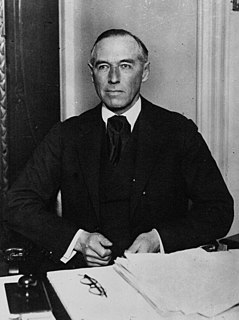 W
WAlfred Ernle Montacute Chatfield, 1st Baron Chatfield, was a Royal Navy officer. During the First World War he was present as Sir David Beatty's Flag-Captain at the Battle of Heligoland Bight in August 1914, at the Battle of Dogger Bank in January 1915 and at the Battle of Jutland in May 1916. After the war he became Commander-in-Chief, Atlantic Fleet and then Commander-in-Chief, Mediterranean Fleet before serving as First Sea Lord in the mid-1930s in which role he won arguments that the Royal Navy should have 70 cruisers rather than the 50 cruisers that had been agreed at the Naval Conference of 1930, that the battleship was still had an important role to play despite the development of the bomber and that the Fleet Air Arm should be part of the Royal Navy rather than the Royal Air Force. He subsequently served as Minister for Coordination of Defence in the early years of the Second World War.
 W
WAdmiral of the Fleet Sir George Cockburn, 10th Baronet, was a Royal Navy officer. As a captain he was present at the Battle of Cape St Vincent in February 1797 during the French Revolutionary Wars and commanded the naval support at the reduction of Martinique in February 1809 during the Napoleonic Wars. He also directed the capture and Burning of Washington on 24 August 1814 as an advisor to Major General Robert Ross during the War of 1812. He went on to be First Naval Lord and in that capacity sought to improve the standards of gunnery in the fleet, forming a gunnery school at Portsmouth; later he ensured that the Navy had the latest steam and screw technology and put emphasis on the ability to manage seamen without the need to resort to physical punishment.
 W
WAdmiral of the Fleet Andrew Browne Cunningham, 1st Viscount Cunningham of Hyndhope, was a senior officer of the Royal Navy during the Second World War. He was widely known by his initials, "ABC".
 W
WAdmiral of the Fleet Sir John Henry Dacres Cunningham was a Royal Navy officer. A qualified senior navigator, he became Director of Plans at the Admiralty in 1930. He saw action as Commander-in-Chief of the Mediterranean Fleet during the Second World War with responsibility for the allied landings at Anzio and in the south of France. He served as First Sea Lord in the late 1940s: his focus was on implementing the Government's policy of scrapping many serviceable ships.
 W
WAdmiral Sir Sydney Colpoys Dacres was an officer of the Royal Navy who saw service during the Greek War of Independence, when he was involved in an attack on the Turkish forces at Morea, and later during the Crimean War. Born into a substantial naval dynasty during the Napoleonic Wars, he eventually rose to the rank of Admiral and became First Naval Lord. His only significant action as First Naval Lord was to press for the abolition of masts. He went on to be Visitor and Governor of Greenwich Hospital.
 W
WAdmiral Sir James Whitley Deans Dundas GCB was a Royal Navy officer. He took part in the Napoleonic Wars, first as a junior officer when he took part in the Anglo-Russian invasion of Holland in Autumn 1799 and later as a commander when he was in action at Copenhagen Dockyard shortly after the capture of that City in August 1807. He also served as Whig Member of Parliament for Greenwich and then for Devizes and became First Naval Lord in the First Russell ministry in July 1847 and in that role his service was dominated by the needs of Whig party. He was appointed Commander-in-Chief in the Mediterranean in 1852 and led all naval operations in the Black Sea including the bombardment of Sevastopol in October 1854 during the Crimean War.
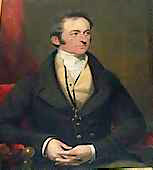 W
WRear Admiral Hon. George Heneage Lawrence Dundas CB was a senior officer in the Royal Navy. As a junior officer he came to prominence due to his brave conduct during a fire on the first-rate HMS Queen Charlotte. As a result of this he was appointed to the command of the sixth-rate HMS Calpe in which he took part in the Battle of Algeciras Bay in July 1801 during the French Revolutionary Wars. After serving for four years as Whig Member of Parliament for Richmond, he was given command of the fifth-rate HMS Euryalus and took part in the unsuccessful Walcheren Campaign in July 1809 during the Napoleonic Wars. He transferred to the third-rate HMS Edinburgh and landed troops at Viareggio in Italy in November 1812 later in that War. He went on to be Member of Parliament for Orkney and Shetland and became First Naval Lord in the First Melbourne ministry in August 1834 but died in office just two months later in October 1834.
 W
WVice-Admiral Sir Richard Saunders Dundas, was a Royal Navy officer. As a captain, he took part in the capture of the Bogue forts in January 1841, during the First Opium War. He was appointed to the command of the Fleet in the Baltic Sea, in succession to Sir Charles Napier, in February 1855 and led the naval support during the latter stages of the Crimean War, enforcing a strict blockade and carrying out the bombardment of Sveaborg in August 1855. He was appointed First Naval Lord in the first Palmerston ministry in November 1857 and then, after stepping down to be Second Naval Lord during the second Derby–Disraeli ministry, he stepped up again to become First Naval Lord in the second Palmerston ministry in June 1859 remaining in office until his death. The Prime-Minister described Dundas as "a most distinguished officer".
 W
WAdmiral Sir Nigel Richard Essenhigh is a former Royal Navy officer who served as First Sea Lord and Chief of the Naval Staff from 2001 to 2002. He served as a navigating officer before commanding the Type 42 destroyer HMS Nottingham and then the Type 42 destroyer HMS Exeter during the Gulf War. As First Sea Lord he entered into a contract to acquire up to 150 Joint Strike Fighter aircraft for the UK's two new aircraft carriers. In retirement he worked for Northrop Grumman and became a non-executive director of Babcock International. He remains a Deputy Lieutenant of Devon.
 W
WAdmiral of the Fleet Sir Frederick Laurence Field, was a senior Royal Navy officer. He served in the Boxer Rebellion as commander of a raiding party and in the First World War as commanding officer of the battleship HMS King George V, flagship of Admiral Martyn Jerram at the Battle of Jutland in May 1916. He went on to be Commander-in-Chief, Mediterranean Fleet before serving as First Sea Lord during the early 1930s in which role dealt with the response to the Invergordon Mutiny in September 1931 and ensured the abandonment in 1932 of the 'ten year rule', an attempt by the treasury to control defence expenditure by requesting the Foreign Office to declare whether there was any risk of war during the next ten years.
 W
WAdmiral of the Fleet John David Elliott Fieldhouse, Baron Fieldhouse, was a Royal Navy officer. He commanded five submarines and a frigate before achieving higher command from the 1970s. Following the invasion of the Falkland Islands by Argentine forces in April 1982, Fieldhouse was appointed Commander of the Task Force given responsibility for "Operation Corporate", the mission to recover the Falkland Islands. The campaign ended in the surrender of Argentine forces in June 1982. He became First Sea Lord and Chief of Naval Staff in December that year and, in that role, persuaded the British Government to fund the replacement of ships lost in the Falklands War. He went on to be Chief of the Defence Staff from 1985 until his retirement in 1988.
 W
WJohn Arbuthnot Fisher, 1st Baron Fisher,, commonly known as Jacky or Jackie Fisher, was a British Admiral of the Fleet known for his efforts at naval reform. He had a huge influence on the Royal Navy in a career spanning more than 60 years, starting in a navy of wooden sailing ships armed with muzzle-loading cannon and ending in one of steel-hulled battlecruisers, submarines and the first aircraft carriers. The argumentative, energetic, reform-minded Fisher is often considered the second most important figure in British naval history, after Lord Nelson.
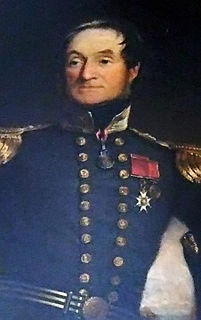 W
WAdmiral Maurice Frederick FitzHardinge Berkeley, 1st Baron FitzHardinge, was a Royal Navy officer. As a junior officer he commanded gunboats on the Tagus, reinforcing the Lines of Torres Vedras, in Autumn 1810 during the Peninsular War and, as a captain, he served on the coast of Syria taking part in the capture of Acre in November 1840 during the Oriental Crisis. He also served as Whig Member of Parliament for Gloucester and became First Naval Lord in the Aberdeen ministry in June 1854 and in that role focussed on manning the fleet and in carrying out reforms and improvements in the food, clothing, and pay of seamen.
 W
WAdmiral of the Fleet Bruce Austin Fraser, 1st Baron Fraser of North Cape, was a senior Royal Navy officer. He served in the First World War, saw action during the Gallipoli Campaign and took part in the internment of the German High Seas Fleet at the end of the war. He also served in the Second World War initially as Third Sea Lord and Controller of the Navy and then as second-in-command and afterwards as commander of the Home Fleet, leading the force that destroyed the German battleship Scharnhorst. He went on to be First Sea Lord and Chief of the Naval Staff in which role he assisted in establishing NATO and agreed to the principle that the Supreme Allied Commander Atlantic should be an American admiral, in the face of fierce British opposition.
 W
WSir Richard Vesey Hamilton was a Royal Navy officer. As a junior officer he twice volunteered to take part in missions to search for Sir John Franklin's ill-fated expedition to find the Northwest Passage. He also took part in the Battle of Fatshan Creek in June 1857 during the Second Opium War.
 W
WVice-Admiral Sir Thomas Masterman Hardy, 1st Baronet, GCB was a Royal Navy officer. He took part in the Battle of Cape St Vincent in February 1797, the Battle of the Nile in August 1798 and the Battle of Copenhagen in April 1801 during the French Revolutionary Wars. He served as flag captain to Admiral Lord Nelson, and commanded HMS Victory at the Battle of Trafalgar in October 1805 during the Napoleonic Wars. Nelson was shot as he paced the decks with Hardy, and as he lay dying, Nelson's famous remark of "Kiss me, Hardy" was directed at him. Hardy went on to become First Naval Lord in November 1830 and in that capacity refused to become a Member of Parliament and encouraged the introduction of steam warships.
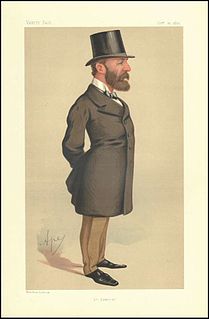 W
WAdmiral of the Fleet Lord John Hay, was a Royal Navy officer and politician. After seeing action in 1842 during the First Opium War, he went ashore with the Naval Brigade and took part in the defence of Eupatoria in November 1854 and the Siege of Sevastopol in spring 1855 during the Crimean War. He also took part in the Battle of Taku Forts in August 1860 during the Second Opium War. As a politician, he became Member of Parliament for Wick and later for Ripon. He was sent to the Mediterranean in July 1878 to take control of Cyprus and to occupy it in accordance with decisions reached at the Congress of Berlin. In a highly political appointment, he was made First Naval Lord in March 1886 when the Marquis of Ripon became First Lord of the Admiralty but had to stand down just five months later when William Gladstone's Liberal Government fell from power in August 1886.
 W
WAdmiral of the Fleet Peter John Hill-Norton, Baron Hill-Norton, was a senior Royal Navy officer. He fought in the Second World War as gunnery officer in a cruiser operating on the Western Approaches and in the North Sea taking part in the Norwegian Campaign, then in a cruiser taking part in the Arctic convoys and finally in a battleship operating in the Eastern Fleet. After the War he commanded a destroyer and then an aircraft carrier. He served as First Sea Lord and Chief of the Naval Staff and then Chief of the Defence Staff in early 1970s. In the latter role he gave the final commitment to Project Chevaline, the Polaris missile improvement programme. He went on to be Chairman of the NATO Military Committee.
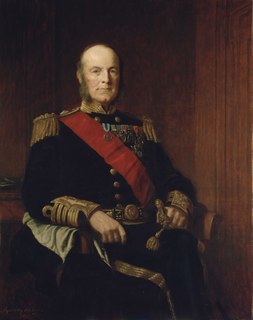 W
WAdmiral Arthur William Acland Hood, 1st Baron Hood of Avalon, was an officer of the Royal Navy. As a junior officer he took part in the capture of Acre during the Oriental Crisis in 1840 and went ashore with the naval brigade at the defence of Eupatoria in November 1854 during the Crimean War. He became First Naval Lord in June 1885 and in that role was primarily concerned with enshrining into law the recommendations contained in a report on the disposition of the ships of the Royal Navy many of which were unarmoured and together incapable of meeting the combined threat from any two of the other naval powers : these recommendations were contained in the Naval Defence Act 1889.
 W
WAdmiral Sir Anthony Hiley Hoskins, was a Royal Navy officer. As a junior officer, he took part in the Cape Frontier War of 1851 and then saw action at the Battle of Canton in December 1857 and the Battle of Taku Forts in May 1858 during Second Opium War. Once promoted to flag officer rank, he acted as Second-in-Command of the Fleet at the bombardment of Alexandria in July 1882 during the Anglo-Egyptian War. He went on to be First Naval Lord in September 1891 but in that role took a relaxed view of the size of the Fleet and did not see the need for a large shipbuilding effort on the scale envisaged by some of his colleagues, such as Admiral Sir Frederick Richards and Admiral Sir John Fisher who were concerned about French and German naval expansion.
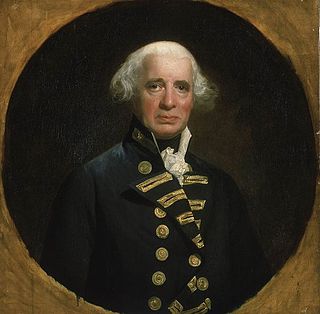 W
WAdmiral of the Fleet Richard Howe, 1st Earl Howe, was a British naval officer. After serving throughout the War of the Austrian Succession, he gained a reputation for his role in amphibious operations against the French coast as part of Britain's policy of naval descents during the Seven Years' War. He also took part, as a naval captain, in the decisive British naval victory at the Battle of Quiberon Bay in November 1759.
 W
WAdmiral of the Fleet Sir Henry Bradwardine Jackson, was a Royal Navy officer. After serving in the Anglo-Zulu War he established an early reputation as a pioneer of ship-to-ship wireless technology. Later he became the first person to achieve ship-to-ship wireless communications and demonstrated continuous communication with another vessel up to three miles away. He went on to be Third Sea Lord and Controller of the Navy, then Director of the Royal Naval War College and subsequently Chief of the Admiralty War Staff. He was advisor on overseas expeditions planning attacks on Germany's colonial possessions at the start of the First World War and was selected as the surprise successor to Admiral Lord Fisher upon the latter's spectacular resignation in May 1915 following the failure of the Gallipoli Campaign. He had a cordial working relationship with First Lord of the Admiralty Arthur Balfour, but largely concerned himself with administrative matters and his prestige suffered when German destroyers appeared in the Channel, as a result of which he was replaced in December 1916.
 W
WAdmiral of the Fleet John Rushworth Jellicoe, 1st Earl Jellicoe, was a Royal Navy officer. He fought in the Anglo-Egyptian War and the Boxer Rebellion and commanded the Grand Fleet at the Battle of Jutland in May 1916 during the First World War. His handling of the fleet at that battle was controversial. Jellicoe made no serious mistakes and the German High Seas Fleet retreated to port, at a time when defeat would have been catastrophic for Britain, but the public was disappointed that the Royal Navy had not won a more dramatic victory given that they outnumbered the enemy. Jellicoe later served as First Sea Lord, overseeing the expansion of the Naval Staff at the Admiralty and the introduction of convoys, but was relieved at the end of 1917. He also served as the Governor-General of New Zealand in the early 1920s.
 W
WAdmiral of the Fleet Sir Caspar John GCB was a senior Royal Navy officer who served as First Sea Lord from 1960 to 1963. He was a pioneer in the Fleet Air Arm and fought in the Second World War in a cruiser taking part in the Atlantic convoys, participating in the Norwegian campaign and transporting arms around the Cape of Good Hope to Egypt for use in the western desert campaign. His war service continued as Director-General of Naval Aircraft Production, as naval air attaché at the British embassy in Washington D.C. and then as Commanding Officer of two aircraft carriers. He went on to serve as First Sea Lord and Chief of the Naval Staff in the early 1960s. In that capacity he was primarily concerned with plans for the building of the new CVA-01 aircraft-carriers.
 W
WAdmiral Sir Philip Andrew Jones, is a retired former senior Royal Navy officer. After service in the South Atlantic in 1982 during the Falklands War, he commanded the frigates HMS Beaver and HMS Coventry. He went on to be Flag Officer, Scotland, Northern England and Northern Ireland, Commander United Kingdom Maritime Forces and Assistant Chief of the Naval Staff before being appointed Fleet Commander and Deputy Chief of the Naval Staff. Jones served as First Sea Lord from April 2016 to June 2019.
 W
WAdmiral of the Fleet Lord Walter Talbot Kerr, was a Royal Navy officer. After taking part in the Crimean War and then the Indian Mutiny, he supervised the handover of Ulcinj to Montenegro to allow Montenegro an outlet to the sea in accordance with the terms of the Treaty of Berlin. He became Flag Captain to the Commander-in-Chief, Channel Squadron and then Commander-in-Chief, Mediterranean Fleet. He went on to be Second-in-Command of the Mediterranean Fleet, then Commander-in-Chief of the Channel Squadron and finally became First Naval Lord. In that capacity he presided over a period of continued re-armament in the face of German naval expansion but was unceasingly harassed by Admiral Sir John Fisher.
 W
WAdmiral of the Fleet Sir Charles Edward Lambe, was a senior Royal Navy officer. He fought in the Second World War in command of a cruiser, as Director of Naval Plans and then in command of an aircraft carrier. He served as First Sea Lord and Chief of the Naval Staff from 1959 until 1960 when he was forced to retire early because of a heart condition. He died only a few months later.
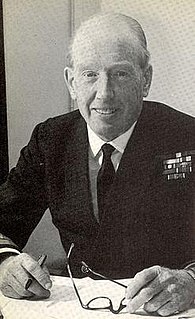 W
WAdmiral of the Fleet Sir Michael Le Fanu was a Royal Navy officer. He fought in the Second World War as gunnery officer in a cruiser operating in the Home Fleet during the Norwegian Campaign and the Battle of the Mediterranean and then as gunnery officer in a battleship operating in the Eastern Fleet before becoming liaison officer between the British Pacific Fleet and the United States Third Fleet. After the War he commanded a frigate, a training establishment and an aircraft carrier. He served as First Sea Lord and Chief of the Naval Staff in the late 1960s. In that role, in the face of economic difficulties, he worked hard to reshape the Navy as an anti-submarine force operating primarily in the Atlantic Ocean.
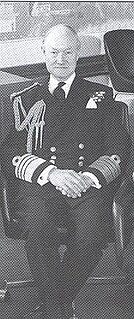 W
WAdmiral of the Fleet Sir Henry Conyers Leach,, was a Royal Navy officer who, as First Sea Lord and Chief of the Naval Staff during the early 1980s, was instrumental in convincing the British prime minister, Margaret Thatcher, that retaking the Falkland Islands from Argentina was feasible. On account of the determination he showed in the matter, the journalist and political commentator, Andrew Marr described him as Thatcher's "knight in shining gold braid".
 W
WAdmiral of the Fleet Sir John Leake was a Royal Navy officer and politician. As a junior officer he saw action at the Battle of Texel during the Third Anglo-Dutch War. He then distinguished himself when he led the convoy that broke the barricading boom at Culmore Fort thereby lifting the Siege of Derry during the Williamite War in Ireland. As a captain he saw action in some of the heaviest fighting at the Battle of Barfleur and was also involved in a successful attack on the French ships at the Battle of La Hogue during the Nine Years' War.
 W
WAdmiral of the Fleet Terence Thornton Lewin, Baron Lewin, was a Royal Navy officer. He served in the Second World War and then commanded a destroyer, the Royal yacht, two frigates and an aircraft carrier before achieving higher command. He was First Sea Lord and Chief of the Naval Staff in the late 1970s and in that role he worked hard to secure a decent wage for servicemen and helped win them a 32% pay rise. He went on to be Chief of the Defence Staff during the Falklands War, serving as chief war planner and as Prime Minister Margaret Thatcher's chief advisor during the war. He was also the first Chief of Defence Staff to act as head of the Armed Forces rather than just Chairman of the Chiefs of Staff Committee.
 W
WAdmiral of the Fleet Louis Alexander Mountbatten, 1st Marquess of Milford Haven,, formerly Prince Louis Alexander of Battenberg, was a British naval officer and German prince related to the British royal family.
 W
WAdmiral Sir John David Luce, was a Royal Navy officer. He fought in the Second World War as a submarine commander before taking part in the Dieppe Raid and becoming Chief Staff Officer to the Naval Forces for the Normandy landings. He also commanded a cruiser during the Korean War. He served as First Sea Lord and Chief of the Naval Staff in the mid-1960s and in that role resigned from the Royal Navy along with Navy Minister Christopher Mayhew in March 1966 in protest over the decision by the Labour Secretary of State for Defence, Denis Healey, to cancel the CVA-01 aircraft carrier programme.
 W
WAdmiral of the Fleet Sir Charles Edward Madden, 1st Baronet, was a Royal Navy officer who served during the First World War as Chief of the Staff to Sir John Jellicoe in the Grand Fleet from 1914 to 1916 and as Second-in-Command of the fleet under Sir David Beatty from 1916 to 1919. He was Commander-in-Chief of the Atlantic Fleet after the war and served as First Sea Lord in the late 1920s. In that role, in order to avoid an arms race, he accepted parity with the United States in the form of 50 cruisers defending his position on the basis that he only actually had 48 cruisers anyway.
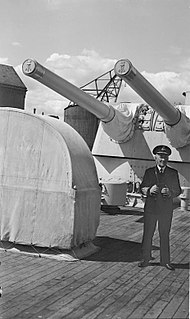 W
WAdmiral of the Fleet Sir Rhoderick Robert McGrigor GCB was a senior Royal Navy officer. He fought in the First World War and saw action during the Gallipoli Campaign and then the Battle of Jutland. He also served in the Second World War, taking part in the sinking of the Bismarck in May 1941, carrying out the office of Assistant Chief of the Naval Staff (Weapons) and commanding the 1st Cruiser Squadron during operations off the Norwegian coast and convoys to North Russia. He served as First Sea Lord in the early 1950s and is most remembered as a leading proponent of carrier-based air power.
 W
WAdmiral of the Fleet Sir Alexander Milne, 1st Baronet, was a Royal Navy officer. As a captain on the North America and West Indies Station he was employed capturing slave-traders and carrying out fishery protection duties. He served as a Junior Naval Lord under both Liberal and Conservative administrations and was put in charge of organising British and French transports during the Crimean War. He became Commander-in-Chief, North America and West Indies Station and in this role he acted with diplomacy, especially in response to the Trent Affair on 8 November 1861 during the American Civil War, when USS San Jacinto, commanded by Union Captain Charles Wilkes, intercepted the British mail packet RMS Trent and removed, as contraband of war, two Confederate diplomats, James Mason and John Slidell. He became First Naval Lord in the third Derby–Disraeli ministry in July 1866 and in this role took advantage of the Government's focus on spending reduction to ask fundamental questions about naval strategy. He again became First Naval Lord in the first Gladstone ministry in November 1872, remaining in office under the second Disraeli ministry and identifying the critical need for trade protection at times of War and demanding new cruisers to protect British merchant shipping.
 W
WAdmiral of the Fleet Louis Francis Albert Victor Nicholas Mountbatten, 1st Earl Mountbatten of Burma, was a British Royal Navy officer and statesman, an uncle of Prince Philip, Duke of Edinburgh, and second cousin once removed of Queen Elizabeth II. During the Second World War, he was Supreme Allied Commander, South East Asia Command (1943–1946). He was the last Viceroy of India (1947) and the first governor-general of independent India (1947–1948).
 W
WAdmiral of the Fleet Sir John Julian Robertson Oswald was a senior Royal Navy officer. After training as a gunnery specialist, Oswald commanded a frigate and then a destroyer before achieving higher command in the navy. He served as First Sea Lord and Chief of Naval Staff in the early 1990s. In that capacity he advised the British Government on the reduction in the size of the fleet under the Options for Change restructuring programme and on the deployment of Naval Support for the Gulf War in 1991: he also made the decision that members of the Women's Royal Naval Service should be allowed to serve in Royal Navy ships.
 W
WAdmiral of the Fleet Sir Peter Parker, 1st Baronet was a Royal Navy officer. As a junior officer, he was deployed with a squadron under Admiral Edward Vernon to the West Indies at the start of the War of Jenkins' Ear. He saw action again at the Battle of Toulon during the War of the Austrian Succession. As captain of the fourth-rate HMS Bristol he took part in the Invasion of Guadeloupe during the Seven Years' War.
 W
WAdmiral of the Fleet Sir Michael Patrick Pollock, was a senior officer in the Royal Navy who rose to become First Sea Lord and Chief of the Naval Staff in the early 1970s. In the Second World War, he was an officer on ships tasked with protecting convoys in the Atlantic and the Mediterranean, and was gunnery officer on the cruiser HMS Norfolk when she fought the German battleship Scharnhorst during the Battle of North Cape. He later commanded the aircraft carrier HMS Ark Royal, and hosted Ian Smith on HMS Tiger. In retirement, he held the position of King of Arms of the Order of the Bath and Gloucester King of Arms, with responsibility for heraldry in Wales.
 W
WAdmiral of the Fleet Sir Alfred Dudley Pickman Rogers Pound, was a British senior officer of the Royal Navy. He served in the First World War as a battleship commander, taking part in the Battle of Jutland with notable success, contributing to the sinking of the German cruiser Wiesbaden. He served as First Sea Lord, the professional head of the Royal Navy, for the first four years of the Second World War. In that role his greatest achievement was his successful campaign against the German U-boats and the winning of the Battle of the Atlantic but his judgment has been questioned over the failed Norwegian Campaign in 1940, his dismissal of Admiral Dudley North in 1940, and Japan's sinking of Prince of Wales and Repulse in late 1941. His order in July 1942 to disperse Convoy PQ 17 and withdraw its covering forces, to counter a threat from heavy German surface ships, led to its destruction by submarines and aircraft. His health failed in 1943 and he resigned, dying shortly thereafter.
 W
WAdmiral of the Fleet Sir Frederick William Richards, was a Royal Navy officer. He commanded a paddle-sloop during the Second Opium War in 1860 and, as senior officer on the Cape of Good Hope and West Coast of Africa Station, he landed on the coast of South Africa with a small naval brigade which he led at the Battle of Gingindlovu and the Siege of Eshowe in April 1879 during the Anglo–Zulu War. He took part in the Battle of Laing's Nek in January 1881 during the First Boer War and, as Commander-in-Chief of the East Indies Station, he organized and equipped a naval brigade to support the British advance up the Irrawaddy River in November 1885 during the Third Anglo-Burmese War. He went on to be First Naval Lord and in that role led a huge shipbuilding and naval works programme undertaken in accordance with the provisions of the Naval Defence Act 1889. The programme was opposed by Prime Minister William Gladstone who was concerned about its vast cost and who resigned after a Cabinet defeat over it in March 1894. The programme continued under the Governments of Lord Rosebery and then Lord Salisbury and Richards remained in office driving the programme throughout the political turmoil.
 W
WAdmiral Sir John Cunningham Kirkwood "Jock" Slater, is a retired Royal Navy officer. He commanded a minesweeper, a frigate and then a destroyer before taking over the aircraft carrier HMS Illustrious and then achieving higher command in the Navy. He served as First Sea Lord and Chief of the Naval Staff from 1995 to 1998: in that capacity he played a key role in the 1998 Strategic Defence Review carried out by the Labour Government that had come to power a year earlier.
 W
WAdmiral Sir Mark Stanhope, is a retired Royal Navy officer. After serving as a submarine commander, he commanded a frigate and then commanded an aircraft carrier on operational patrol off Sierra Leone. He went on to be Deputy Supreme Allied Commander Transformation and then Commander-in-Chief Fleet. He served as First Sea Lord and Chief of the Naval staff, the professional head of the Royal Navy, from July 2009 to April 2013. In this role he advised the British Government on the deployment of naval forces during operations around Libya. He was succeeded by Admiral Sir George Zambellas in April 2013.
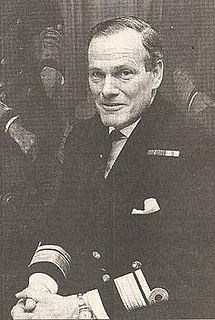 W
WAdmiral of the Fleet Sir William Doveton Minet Staveley was a Royal Navy officer. Staveley saw service as a minesweeper commander on coastal patrol during the Indonesia–Malaysia confrontation before commanding a frigate and then an aircraft carrier and ultimately achieving higher command in the Navy. He served as First Sea Lord and Chief of Naval Staff in the late 1980s. In that role he fought hard for a fleet large enough to meet NATO commitments.
 W
WAdmiral Sir George Greville Wellesley was a Royal Navy officer. As a junior officer he took part in the capture of Acre during the Oriental Crisis in 1840 and, as Captain of HMS Cornwallis in the Baltic Fleet, he took part in the Bombardment of Sveaborg in August 1855 during the Crimean War. He went on to be Commander-in-Chief of the North America and West Indies Station and then Commander-in-Chief of the Channel Squadron but was relieved of the latter post by a court-martial after an incident in which an armoured frigate, which had been under his command at the time, ran aground at Pearl Rock off Gibraltar in July 1871. He was appointed First Naval Lord in November 1877 and in that capacity he secured a considerable increase in naval construction, for example on the Colossus-class battleships, although some of these ships were of doubtful quality.
 W
WAlan William John West, Baron West of Spithead, is a retired admiral of the Royal Navy and formerly, from June 2007 to May 2010, a Labour Parliamentary Under-Secretary of State at the British Home Office with responsibility for security and a security advisor to Prime Minister Gordon Brown. Prior to his ministerial appointment, he was First Sea Lord and Chief of the Naval Staff from 2002 to 2006.
 W
WAdmiral of the Fleet Rosslyn Erskine Wemyss, 1st Baron Wester Wemyss,, known as Sir Rosslyn Wemyss between 1916 and 1919, was a Royal Navy officer. During the First World War he served as commander of the 12th Cruiser Squadron and then as Governor of Moudros before leading the British landings at Cape Helles and at Suvla Bay during the Gallipoli Campaign. He went on to be Commander of the East Indies & Egyptian Squadron in January 1916 and then First Sea Lord in December 1917, in which role he encouraged Admiral Roger Keyes, Commander of the Dover Patrol, to undertake more vigorous operations in the Channel, ultimately leading to the launch of the Zeebrugge Raid in April 1918.
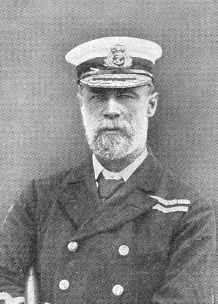 W
WAdmiral of the Fleet Sir Arthur Knyvet Wilson, 3rd Baronet was a Royal Navy officer. He served in the Anglo-Egyptian War and then the Mahdist War being awarded the Victoria Cross during the Battle of El Teb in February 1884. He went on to command a battleship, the torpedo school HMS Vernon and then another battleship before taking charge of the Experimental Torpedo Squadron. He later commanded the Channel Fleet. He briefly served as First Sea Lord but in that role he "was abrasive, inarticulate, and autocratic" and was really only selected as Admiral Fisher's successor because he was a supporter of Fisher's reforms. Wilson survived for even less time than was intended by the stop-gap nature of his appointment because of his opposition to the establishment of a Naval Staff. Appointed an advisor at the start of World War I, he advocated offensive schemes in the North Sea including the capture of Heligoland and was an early proponent of the development and use of submarines in the Royal Navy.
 W
WAdmiral Sir Hastings Reginald Yelverton, was a Royal Navy officer. As a junior officer he took part in a major action against pirates off Candia in June 1826 and was involved in protecting British interests during the Portuguese Civil War during the early 1830s. He saw action in the Crimean War as Captain of one of the two ships that captured a Russian barque beneath the batteries at Ekenäs in Finland in May 1854. Then in July 1873 he took part in the suppression of the Cantonal Revolution in Cartagena. He became First Naval Lord in September 1876 and in that role implemented a series of economies demanded by the Disraeli ministry but was also involved in ordering the small, cheap and thoroughly unsuccessful ironclad Ajax-class battleships.
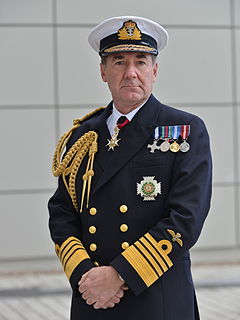 W
WAdmiral Sir George Michael Zambellas, is a retired Royal Navy officer. He was the First Sea Lord and Chief of the Naval Staff from April 2013 until he handed over duties to Admiral Sir Philip Jones in April 2016.